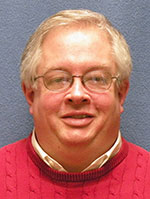Reflection / Sean Gallagher
A Hidden Life answers the question, ‘What does Christ want of us?’
 In 2016, legendary filmmaker Martin Scorsese made a movie called Silence. It was an adaptation of the 1966 novel of the same name by a Catholic Japanese novelist Shusaku Endo.
In 2016, legendary filmmaker Martin Scorsese made a movie called Silence. It was an adaptation of the 1966 novel of the same name by a Catholic Japanese novelist Shusaku Endo.
The novel and the movie tell the story of 17th-century Jesuit missionaries to Japan who, under tremendous pressure, give in to persecutors in the Japanese government and actually cooperate with them.
When the film was released, filmmaker Terrence Malick, legendary in his own way, wrote Scorsese a letter in which he asked him, “What does Christ want from us?”
It seems that Malick may have answered that question himself in A Hidden Life, his movie inspired by the life of Blessed Franz Jaegerstetter that was released late last year.
Jaegerstetter was an Austrian farmer during World War II. A husband and the father of three young children, he opposed the rule of Adolf Hitler on the grounds of his faith. When he was called up for duty in the German army, he refused to swear loyalty to Hitler. Arrested immediately, he was tortured and eventually executed in 1943.
The Church beatified him as a martyr in 2007 in a liturgy that his then-aged widow, Fani, attended.
Amid the beauty of both the Austrian mountains and Franz and Fani’s marriage, Malick dramatically portrayed how Jaegerstetter faced pressure from many sides to go along with everyone else and swear loyalty to Hitler.
His fellow villagers turned their backs on him, considering him a traitor. A Nazi official and others tried to reason with him, suggesting that he was motivated by pride, thinking that he knew better than everyone else. His parish priest tried to convince him that his sacrifice would accomplish nothing and leave his family without a husband and father. His bishop told him that he had a “duty to the Fatherland.”
Even Fani, who showed him so much support, pleaded with him to try find a way to satisfy the Nazi authorities and still be true to his conscience.
Franz, however, couldn’t find such a pathway. He never wavered in his convictions, even though he experienced great pain in paying the cost of doing so. Up to the last minute, he had chances to give in and save his life. “Sign this paper and you’ll go free,” his attorney tells him. “But I am free,” Franz says in reply.
When, with the help of God’s grace, we embrace the logic of the Gospel over the wisdom of the world, we are truly free. The world may do its worst to us to force us to walk its path. But through the love of Christ and joy of the Gospel that can fill our hearts, we can be free of the world’s seemingly irresistible power.
Embracing the logic of the Gospel in the face of mortal threats has nonetheless been a tremendous challenge for believers from the earliest days of the Church. And it remains so today.
We may not face the same dire consequences when we stand firm in our faith that Franz Jaegerstetter experienced. But the growing secularization of our society and its hostility toward the application of faith in public life presents this generation of Catholics and other Christians in America with significant challenges that cannot be ignored.
Thankfully, we have a great cloud of witnesses who can help us with their example and prayers, especially those who lived either in or close to our own time: Christians in the Middle East who have given their lives for Christ in recent years; Franz Jaegerstetter and others who opposed the Nazis; Mexicans who died as martyrs for the freedom of the Church during the Cristero War in the 1920s.
May these martyrs help us as we face our own particular challenges to our faith to give the same answer to the question, “What does Christ want from us?” that Franz Jaegerstetter gave so heroically.
(Sean Gallagher is a reporter for
The Criterion.) †
 In 2016, legendary filmmaker Martin Scorsese made a movie called Silence. It was an adaptation of the 1966 novel of the same name by a Catholic Japanese novelist Shusaku Endo.
In 2016, legendary filmmaker Martin Scorsese made a movie called Silence. It was an adaptation of the 1966 novel of the same name by a Catholic Japanese novelist Shusaku Endo.